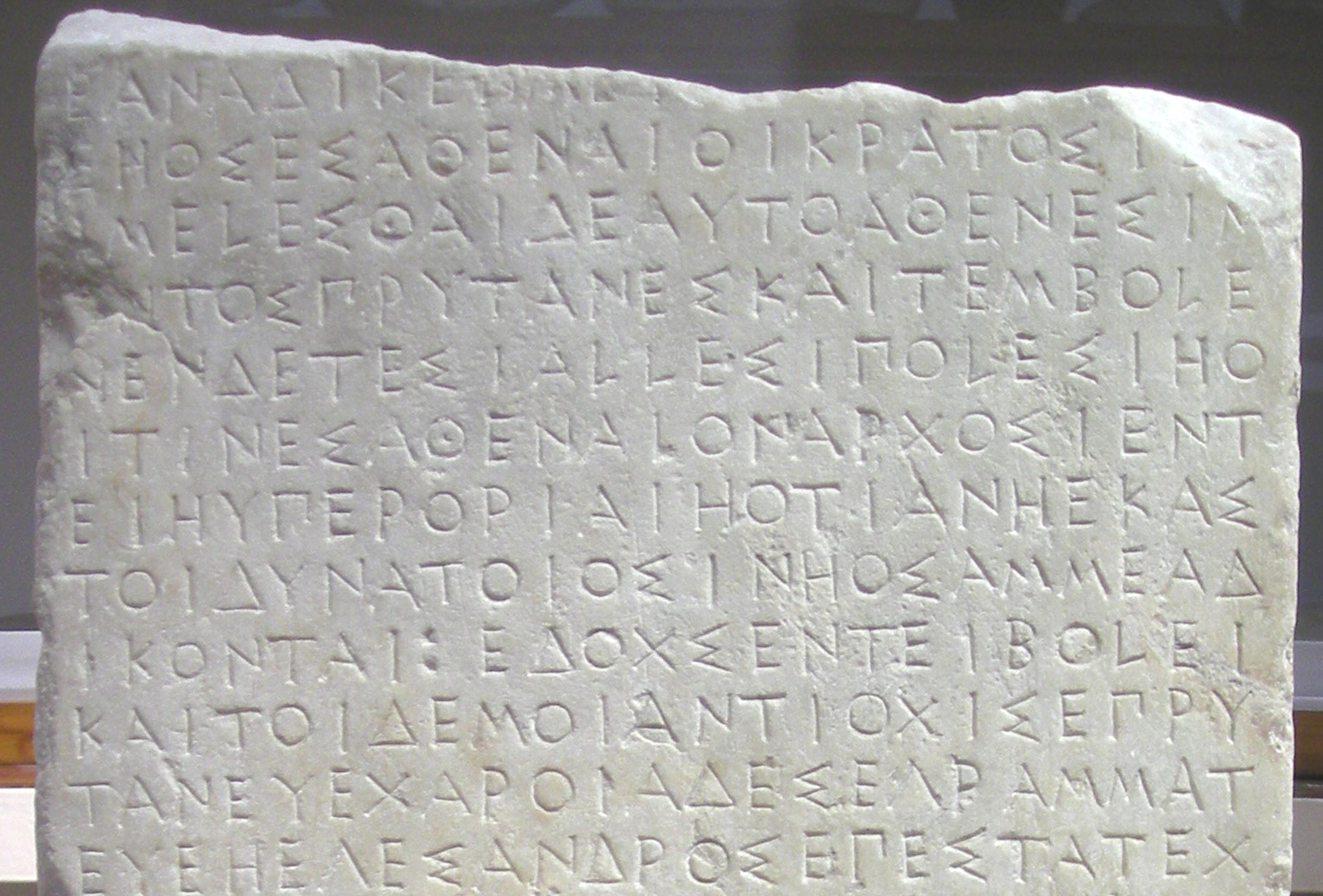
May 3, 2015, by Richard Rawles
‘Even mortal hands break a stone’: electoral promises and the epigraphic habit
[disclosure: the writer is a member of the Labour party; but here at Argonauts and Emperors we think of ourselves as the BBC of classical bloggery: Scrupulously Fair And Balanced]
One feature of recent UK politics might be called ‘promise inflation’. Once there were pledges; during the referendum campaign in Scotland the promise made by the leaders of the three largest UK parties was labelled as ‘The Vow’. Now the stakes have been raised: in one of the stranger stories of the campaign, we find that, if he becomes Prime Minister, the leader of the Labour party will set up in Downing Street an inscription with his election pledges quite literally ‘set in stone’. (Thanks to Maria Pretzler for drawing my attention to this.)
Even now, there is room for epigraphic one-upmanship. I note that the Labour stele is made of limestone. London’s acid rain will corrode it, and the inscription will become less legible as the years pass. Watch out for one of the other parties proposing a marble stone.
Classicists will think of the ancient ‘epigraphic habit’: the Athenians and others were very fond of recording laws and decrees and the like on stone, in part because of the same sense of permanence and public visibility which Labour presumably wants to communicate. Cynics will think of examples of ways in which such permanence might be mitigated and inconvenient inscriptions concealed or disposed of. On the Roman side, inscriptions could be altered by removing the names of persons who had lost favour with the emperor (damnatio memoriae: the subject of a recent successful PhD at Nottingham).
I was reminded of earlier responses to inscribed poetry. This was a famous example of an inscribed epitaph in the archaic and classical periods, apparently composed for inscription on the stone base of a bronze statue:
I am a bronze maiden, and I rest here upon the tomb of Midas.
For as long as water flows and great trees flourish,
and the sun shines as it rises, and the splendid moon,
and the rivers flow, and the sea washes on the shore,
remaining here on his much-lamented tomb
I shall announce to passers-by that Midas is buried here.
The inscription boasts that the statue (in fact lost) will survive for ever, and preserve Midas’ name with it.
This claim was contested: we have a passage of Simonides which attributes the epigram to the sage and tyrant Cleoboulos of Lindos, and rejects its message as ‘the counsel of a fool’:
What man who can trust his wits would commend Cleoboulos, dweller in Lindus, who set against ever-flowing rivers, spring flowers, the flame of the sun or the golden moon, or the eddies of the sea the force of a stele? All things are less than the gods. Even mortal hands break a stone. This was the counsel of a fool.
From our point of view, Simonides seems right: we have the epigram (in various forms) from literary sources, but the statue beneath which it purports to have been inscribed has indeed been destroyed by time, along with the inscription itself. So much for writing ‘set in stone’…
For some, Simonides is expressing hostility to the very idea of inscriptions or monuments preserving memory through time, yet superficially this is an odd idea, since Simonides himself was famous as a poet of inscribed epigrams. Rather than rejecting inscription altogether, I think Simonides prefers a different model for the relationship between inscription and the traditional, oral fame associated with poetry since Homer. We may note the implicit contrast between the static, fixed statue and the ‘ever-flowing’ motion of the rivers (the Greek word, ἀέναος, is one used by Simonides elsewhere, and can be associated with the long-lasting but mobile, unfixed nature of oral diffusion of fame by song). In relation to epigraphic memory, whether of the dead or of political promises, this might remind us of a piece of wisdom associated with the early philosopher Heraclitus:
πάντα ῥεῖ
‘All things are flowing’ ‘All things are in flux’
Perhaps there is political wisdom here, too… There are good reasons for mistrust in politicians (keeps them on their toes!), but one might also wonder whether it would be a better polity in which we had enough trust in politicians for them to be able to say ‘This is not a promise set in stone: it is what we want to do, but since the future is unpredictable and circumstances may change, our policies may change also.’
[image: IG I3 156, a decree of the Athenian boule (council), 440-425 BC. Photo from https://en.wikipedia.org/wiki/File:Athenian_decree.jpg Public domain.]

A couple of other classical responses to the same “edstone” phenomenon, by Maria Pretzler and Peter Kruschwitz:
https://thepetrifiedmuse.wordpress.com/2015/05/09/recycle-for-britain/
http://pretzler.net/blog/2015/05/05/on-pledges-carved-in-stone/